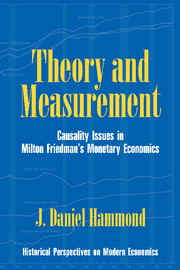Book contents
- Frontmatter
- Contents
- Acknowledgments
- Introduction
- 1 Theory and Measurement at the National Bureau
- 2 Origins of Friedman's Marshallian Methodology
- 3 Origins of the Monetary Project
- 4 Critiques from Within the National Bureau
- 5 Post Hoc Ergo Propter Hoc: Part I
- 6 Reactions to the Monetary History
- 7 Post Hoc Ergo Propter Hoc: Part II
- 8 Friedman and His Critics on the Theoretical Framework
- 9 The Great Depression
- 10 Measurement without Measurement: Hendry and Ericsson's Critique
- Conclusion
- Appendix
- Bibliography
- Index
5 - Post Hoc Ergo Propter Hoc: Part I
Published online by Cambridge University Press: 16 September 2009
- Frontmatter
- Contents
- Acknowledgments
- Introduction
- 1 Theory and Measurement at the National Bureau
- 2 Origins of Friedman's Marshallian Methodology
- 3 Origins of the Monetary Project
- 4 Critiques from Within the National Bureau
- 5 Post Hoc Ergo Propter Hoc: Part I
- 6 Reactions to the Monetary History
- 7 Post Hoc Ergo Propter Hoc: Part II
- 8 Friedman and His Critics on the Theoretical Framework
- 9 The Great Depression
- 10 Measurement without Measurement: Hendry and Ericsson's Critique
- Conclusion
- Appendix
- Bibliography
- Index
Summary
Introduction
The earliest published charges that Friedman's empirical analysis of the relationship of money and income was based on spurious correlation were by John M. Clark and John M. Culbertson, a decade before the more famous post hoc critique of James Tobin (1970a). Clark shared with Tobin the view that money was less important than Friedman believed. Culbertson's views on the importance of money were closer to Friedman's. This makes his exchange with Friedman in the Journal of Political Economy especially useful, for it allows separation of methodology from Keynesian–monetarist doctrine. Aside from their sharing the critical theme that Friedman's conclusions were based on spurious correlation, Culbertson and Tobin appeared on the surface to have had little in common. The two economists held different views on the importance of money and they took different approaches to point out deficiencies in Friedman's analysis.
Tobin (see Chapter 7) wrote down “Keynesian” and “monetarist” models that produced simulated patterns of behavior in money and income that appear to be inconsistent with the models' structures. In his strict Keynesian model, money does not matter at all in the determination of income, yet temporally, money leads income. In the monetarist model, money is the cause of income; yet money follows income in time. His point was that one cannot infer the underlying structure of the economy from observed patterns of timing between the variables of interest; temporal priority does not necessarily indicate causal priority.
- Type
- Chapter
- Information
- Theory and MeasurementCausality Issues in Milton Friedman's Monetary Economics, pp. 88 - 104Publisher: Cambridge University PressPrint publication year: 1996



